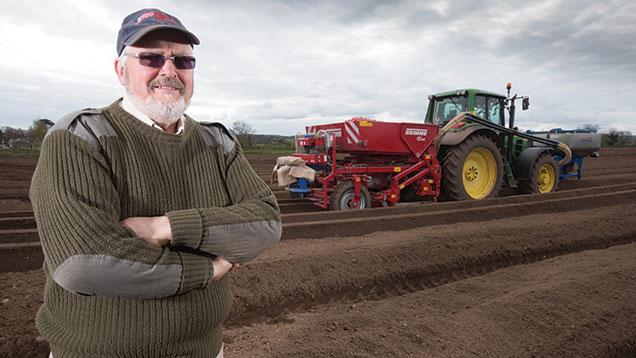Benchmarking soils may help boost potato yields
 © Tim Scrivener
© Tim Scrivener Benchmarking soils on their “DNA fingerprint” could prove valuable in helping farmers break through the potato yield plateau seen in the past decade.
Potato growers have suffered a torrid time recently with a slump in prices and potatoes appearing less on our dinner plates. However, scientists are making big steps into understanding soils and how to manage them to boost crops.
See also: Only 100 harvests left in UK farm soils, scientists warn
Tony Miller of the John Innes Centre said farmers could soon be in a position to take the next step in soil management, benefitting from developments into the understanding of microbial diversity in soils.
He pointed out that while steps had been taken in the past to lab culture some microbes, the new opportunity to “DNA fingerprint” them had opened a gateway to a much better understanding of all the microbial populations in fields.
Each gram of soil contains 10bn bacterial cells, as well as culturable bacteria, bacterial species and fungal spores. A range of species can be present in any soil and this depends on the soil type and previous crop.
“I think the measure of the diversity of microbial species will help give farmers an indication of their soil health and we are not far off this,” he said.
Growers are having to look at more specific ways to optimise their crop in such testing times and going down to the microscopic level could be the way forward, said Dr Miller at the recent Cambridge University Potato Growers Research Association (Cupgra) annual conference.
Measuring microbial diversity could also benefit farmers by optimising the availability of trace elements that are already in the soil.
A healthy soil is generally one with a bigger diversity of microbes and increasing the organic matter in the soil will increase the microbial populations, said Dr Miller.
“Soils are incredibly important and the fulcrum to our business and the organic matter is at the heart of it.” James Daw
Staffordshire farmer James Daw is already looking to improve his soils and has already invested in technology, such as GPS yield mapping and electrical conductivity surveys, to increase his yields and ensure he is looking after his soils.
“Soils are incredibly important and the fulcrum to our business and the organic matter is at the heart of it,” he explains.
Scanning the soils and “ground truthing” have revealed the variability in soils and have allowed Mr Daw to pinpoint areas that he needed to worked.
The large variation in organic matter on his land has had a big impact on yield and he believes it is one of the biggest reasons for the yield plateau seen by the sector over the past 10 years.
“It’s not just a case of trying to increase organic matter, but also to prevent it depleting any further,” he says.
Mr Daw has tackled it by incorporating cover crops into the rotation and returning straw and farmyard muck to the field.
In addition to experimenting with new technology, Mr Daw has reduced the cultivations in his potato crops on his farm citing overcultivation as a big problem affecting many farmers.
He explained that understanding the condition of his soils has allowed him to focus subsoiling only (rather than ploughing) in areas that needed it. Coupled with this, he had reduced the depth of his destoning operation to help improve the soils.
“Soils took a real hammering in 2012 and it has taken us two years to get them back to a reasonable level,” he said.

